
“Leadership is taking responsibility for what matters most.” — Julian Weissglass
This quote has stayed with me for years. And right now, in a time marked by uncertainty, transition, and volatility, it feels more important than ever.
I often wonder:
The truth is—this past year has broken many of us open. Whether acknowledged or not, many leaders and teams are carrying layers of micro and macro grief: grieving what once was, what will no longer be, and who we are becoming in the process. Change always changes us.
And here’s what I’ve learned, personally and professionally: There is tender strength in being broken open. It’s a quiet kind of power—not always visible on the surface, but deeply transformative from the inside out. And it’s in this space of courageous vulnerability that impactful leadership emerges.
In thinking about breaking open, I’m reminded of the Japanese art form Kintsugi, where broken pottery is mended with gold or silver lacquer. Instead of hiding the cracks, the repairs highlight them—transforming what was once fractured into something more beautiful, more resilient. The cracks become part of the story.
There’s a profound leadership lesson here: Our imperfections—our missteps, lessons-learned, and all the unknowns we're holding—are not signs of failure. They can be evidence of growth. And when we share them openly (and don't pretend to have everything figured out), we foster connection, not separation.
And research backs this up. According to Google’s Project Aristotle, psychological safety—the belief that one can show up authentically without fear of judgment—is the #1 predictor of high-performing teams. Studies show that teams with high psychological safety are:
When leaders model vulnerability, active listening, and nonjudgmental curiosity, they create conditions for trust, innovation, and belonging. They give others permission to show up fully—not in spite of their humanity, but because of it.
So here’s to the golden brokenness and all the imperfect edges that make us whole. Here’s to leaders who embrace the full spectrum of emotion and who are committed to learning every step of the way. Here’s to the courageous ones willing to go inward, lead with presence, and make space for others to do the same.
During times like these, it seems to me that this kind of leadership isn’t just nice to have—it’s necessary.
What do you think?